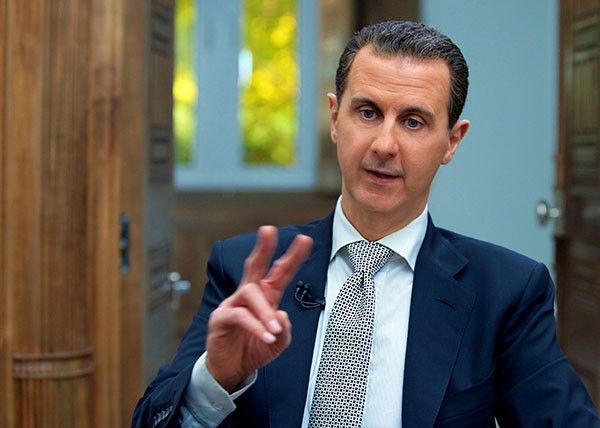Syria's Assad: Chemical attack '100 percent fabrication'
April 14, 2017 | 3:40pm

A handout picture released by the Syrian presidency's press office shows Syrian President Bashar al-Assad during an interview with AFP in the capital Damascus, on April 12, 2017.
Handout / Syrian Presidency Press Office / AFP
Damascus, Syria — Syrian President Bashar al-Assad said a suspected chemical weapons attack was a "fabrication" to justify a US military strike, as Moscow digs in to defend its ally despite increasing strains with Washington.
In an exclusive interview with Agence France-Presse in Damascus—his first since the alleged April 4 attack prompted a US air strike on Syrian forces—Assad said his army had given up all its chemical weapons and that Syrian military firepower was not affected by the US strike.
"Definitely, 100 percent for us, it's fabrication," he said in the interview on Wednesday of the alleged chemical weapons attack.
"Our impression is that the West, mainly the United States, is hand-in-glove with the terrorists. They fabricated the whole story in order to have a pretext for the attack."
Western leaders including US President Donald Trump have accused Assad of being behind last week's attack in the rebel-held town of Khan Sheikhun, saying his forces unleashed a chemical weapon during an air strike.
The suspected attack killed at least 87 people, including many children, and images of the dead and of suffering victims provoked global outrage.
The US State Department said Thursday that it amounted to a "war crime."
Spokesman Mark Toner also ridiculed the Syrian president's comments to Agence France-Presse, describing them as "vintage Assad."
"It is an attempt by him to throw up false flags, create confusion," Toner said.
Syria has denied any use of chemical weapons and Moscow said the deaths were the result of a conventional strike hitting a rebel arms depot containing "toxic substances."
The world's chemical weapons watchdog said Thursday that allegations a chemical attack took place in Khan Sheikhun were "credible."
The Organisation for the Prohibition of Chemical Weapons said experts had analyzed available information "and their preliminary assessment (was) that this was a credible allegation".
'Fake videos'
In the interview, Assad insisted it was "not clear" whether an attack on Khan Sheikhun had even happened.
"You have a lot of fake videos now," he said. "We don't know whether those dead children were killed in Khan Sheikhun. Were they dead at all?"
He insisted his forces had turned over all chemical weapons stockpiles in 2013, under a deal brokered by Russia to avoid threatened US military action.
"There was no order to make any attack, we don't have any chemical weapons, we gave up our arsenal a few years ago," Assad said.
He said his forces had not been diminished by the US strike.
"Our firepower, our ability to attack the terrorists hasn't been affected by this strike."
Denouncing a "very barbaric" attack, Trump ordered a strike that saw 59 Tomahawk cruise missiles slam into the airbase in central Syria from where Washington accused Assad's forces of launching the attack.
Trump bats aside criticism
It was the first direct US military action against Assad's forces since Syria's civil war began six years ago and led to a quick downward spiral in ties between Washington and Moscow.
Russia accused the US of breaking international law with the attack against the Syrian regime, a key ally that Moscow has supported with air strikes since 2015.
Trump gave such criticism short shrift on Wednesday, saying: "I felt we had to do something about it. I have absolutely no doubt we did the right thing."
On Thursday Trump expressed confidence that US-Russia ties would improve.
"Things will work out fine between the U.S.A. and Russia," he tweeted. "At the right time everyone will come to their senses & there will be lasting peace!"
The polarized positions were evident at the UN Security Council Wednesday, when Russia vetoed a Western-drafted resolution that would have required Syrian cooperation in an investigation into the suspected chemical attack.
It was the eighth time Russia has used its veto to block action directed at Damascus.
'Western hysteria'
US Secretary of State Rex Tillerson received a frosty reception Wednesday on a visit to Moscow, where he said there was "a low level of trust" between the countries.
Russia's Foreign Minister Sergei Lavrov said Thursday he and Tillerson had discussed the US strike and agreed "such a situation should not be repeated."
On Thursday, Moscow hosted Syrian Foreign Minister Walid Muallem for talks with Lavrov, ahead of a three-way meeting Friday with Foreign Minister Mohammad Javad Zarif of Iran, another Assad ally.
"In the context of Western hysteria, it's essential not to give in to provocations and not to allow anything that might undermine efforts exerted as part of the Astana and Geneva processes," Lavrov said, referring to Syria peace talks.
Since starting with mass protests in March 2011, Syria's conflict has spiraled into a devastating civil war that has killed more than 320,000 people and forced millions from their homes.
The war led to the emergence of the Islamic State jihadist group, which seized control of large parts of Syria and Iraq in 2014 but has since lost much of its territory.
IS is facing twin offensives by Iraqi forces in the city of Mosul and by an Arab-Kurdish alliance on its de facto Syrian capital Raqa, backed by a US-led coalition that launched air strikes against the jihadists in 2014.
The coalition said Thursday its air strikes had accidentally killed 18 members of the Syrian alliance south of Tabqa, a strategically important town on the Euphrates River near Raqa.
BrandSpace Articles
<
>
- Latest
- Trending
Trending
Latest
Trending
Latest
Recommended































